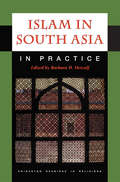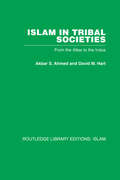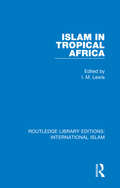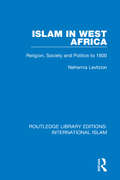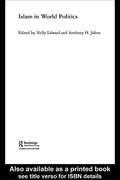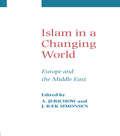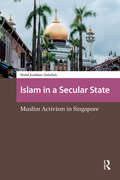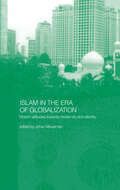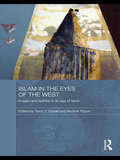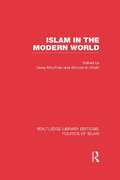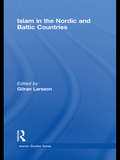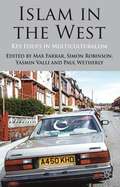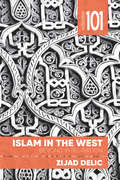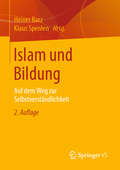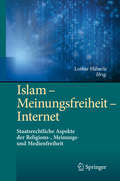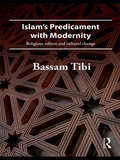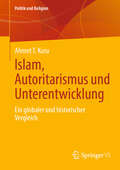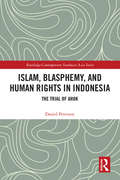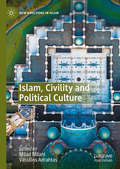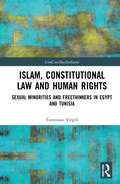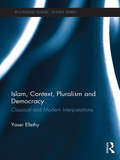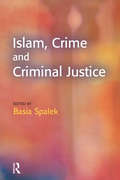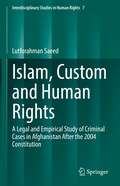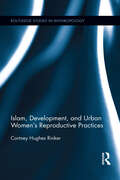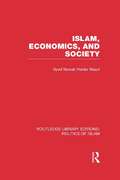- Table View
- List View
Islam in South Asia in Practice (Princeton Readings in Religions #33)
by Barbara D. MetcalfThis volume of Princeton Readings in Religions brings together the work of more than thirty scholars of Islam and Muslim societies in South Asia to create a rich anthology of primary texts that contributes to a new appreciation of the lived religious and cultural experiences of the world's largest population of Muslims. The thirty-four selections--translated from Arabic, Persian, Urdu, Bengali, Tamil, Gujarati, Hindavi, Dakhani, and other languages--highlight a wide variety of genres, many rarely found in standard accounts of Islamic practice, from oral narratives to elite guidance manuals, from devotional songs to secular judicial decisions arbitrating Islamic law, and from political posters to a discussion among college women affiliated with an "Islamist" organization. Drawn from premodern texts, modern pamphlets, government and organizational archives, new media, and contemporary fieldwork, the selections reflect the rich diversity of Islamic belief and practice in South Asia. Each reading is introduced with a brief contextual note from its scholar-translator, and Barbara Metcalf introduces the whole volume with a substantial historical overview.
Islam in Tribal Societies: From the Atlas to the Indus
by Akbar S. Ahmed David M. HartA lively debate is currently being conducted in the social sciences around the concepts of "tribe", "segmentary societies" and "Islam in society". This wide-ranging collection by thirteen distinguished anthropologists contributes to the debate by examining various segmentary Islamic tribal societies from Morocco to Pakistan.
Islam in Tropical Africa (Routledge Library Editions: International Islam #4)
by I. M. LewisFirst published in 1980, this second edition of Islam in Tropical Africa presents specialist studies of the history and sociology of Muslim communities in Africa south of the Sahara. The studies cover an extensive and range of time and place, and include consideration of particular aspects of Muslim belief and practice in regions such as Senegal and Somalia. The second edition includes an updated introduction which draws attention to the ways in which differently organized traditional cultures and social systems had reacted and adapted to Muslim influence in the field of politics, law and ritual in the second half of the twentieth century. This book will be of interest to those studying Islam, African studies and ethnography.
Islam in West Africa: Religion, Society and Politics to 1800 (Routledge Library Editions: International Islam #3)
by Nehemia LevtzionFirst published in 1994, this volume brings together essays from the celebrated scholar of African history, Nehemia Levtzion. The articles cover a wide range of themes including Islamization, Islam in politics, Islamic revolutions and the work of the historian in studying this field. This collection is a rich source of supplementary material to Professor Levtzion’s major publications on Islam in West Africa. This book will be of key interest to those studying Islamic and West African history.
Islam in World Politics (Routledgecurzon Advances In Middle East And Islamic Studies)
by Nelly Lahoud Anthony H. JohnsThe essays in this collection examine the emergence of Islam as a force in today’s international political arena. Driven by a concern to understand factors leading to, and the implications of, this heightened political profile the contributors go beyond polemics and apologetics. The book critically examines some of the major events, movements and trends in the Islamic world over the past fifty years and their impact on the international scene. Reflecting the diversity and heterogeneity of the Muslim world, the book covers issues including: the challenge of Islamism to the Muslim world the use of Islam as a political tool on the international scene Islam’s contribution to the theory and practice of global finance Islam’s role in gender discourse Islam’s articulations in the Indian Sub-continent, Southeast Asia, Central Asia and the Arab world. Very little of the current literature deals with political Islam globally, and very few books go much beyond the Middle East and its terrorist groups. This volume fills that gap, providing a compelling cross-national, cross-cultural and interdisciplinary analysis of Islam as a potent political force.
Islam in a Changing World
by Anders Jerichow J. B. SimonsenPapers from a conference held in Copenhagen in 1996 on the compatibility between Islam and universal norms and values, and the perspectives for dialogue and mutual understanding.
Islam in a Secular State: Muslim Activism in Singapore (Religion and Society in Asia)
by Walid Jumblatt AbdullahThe overtly secular state of Singapore has unapologetically maintained an interventionist approach to governance in the realm of religion. Islam is particularly managed by the state. Muslim activists thus have to meticulously navigate these realities – in addition to being a minority community – in order to maximize their influence in the political system. Significantly, Muslim activists are not a monolith: there exists a multitude of political and theological differences amongst them. Islam in a Secular State: Muslim Activism in Singapore analyses the following categories of Muslim activists: Islamic religious scholars (ulama), liberal Muslims, and the more conservative-minded individuals. Due to constricting political realities, many activists attempt to align themselves with the state, and call upon the state to be an arbiter in their disagreements with other factions. Though there are activists who challenge the state, these are by far in the minority, and are typically unable to assert their influence in a sustained manner. The author draws upon his own experiences as a researcher and as someone who was involved in some of the discourses explored in this book.
Islam in the Era of Globalization: Muslim Attitudes towards Modernity and Identity (Routledgecurzon Studies In Asian Religion #No.6)
by Johan MeulemanGlobalization, modernity and identity are fundamental issues in contemporary Islam and Islamic Studies. This collection of essays reflects the wide diversity that characterises contemporary Islamic Studies. The case studies cover regions stretching from China and Southeast Asia to diaspora communities in the Caribbean and Tajikistan. There is significant participation of intellectual voices from all areas concerned, providing a real contribution to the academic exchange between the Muslim and the Euro-American worlds.
Islam in the Eyes of the West: Images and Realities in an Age of Terror (Durham Modern Middle East and Islamic World Series)
by Tareq Y. IsmaelFrom the terrorist attacks of September 11, 2001 in New York to the Madrid and London bombings of 2004 and 2005, the presence of Muslim communities in the West has generated security issues and major political concern. The government, the media, and the general public have raised questions regarding potential links between Western Muslims, radical Islam and terrorism. This speculation has given rise to popular myths concerning the Islamic world and led to a host of illiberal measures such as illegal warranting, denial of Habeas Corpus, "black prisons" and extreme torture throughout the democratic world. This book challenges the authenticity of these myths and examines the ways in which they have been used to provide an ideological cover for the "war on terror" and the subsequent Iraq war. It argues that they are not only unfounded and hollow, but have also served a dangerous purpose, namely war-mongering and the empowering of the national-security state. It further considers the origin and transmission of these myths, focusing on media, government policy and popular discourse.
Islam in the Modern World (Routledge Library Editions: Politics of Islam)
by Denis Maceoin Ahmed Al-ShahiIn recent years, events in the Islamic world have captured the attention of the West to an unprecedented degree. However, much of the media coverage of events like the Islamic revolution in Iran has merely reinforced current prejudices and misconceptions about Islam. This collection of essays, by specialists in a variety of disciplines, gives an impressionistic overview of contemporary Islam. Different areas of Islamic life are singled out for special attention; these include the problem of relations between Islam and the West, the role of the Sufi orders and the revival of religious fundamentalism, Islam and the feminine, Islamic economics and Islamic architecture. Geographically, the essays cover a wide area, ranging over Sudan, Turkey, Iran, Egypt and Saudi Arabia. Each discussion should appeal to the layman and specialist alike and collectively they bring together a comprehensive range of material not often covered in one volume. Above all, they cut across the stereotypes of Islam found in the popular media, to reveal facets of a complex, living tradition often unsuspected in the West. First published in 1983.
Islam in the Nordic and Baltic Countries (Routledge Islamic Studies Series)
by Göran LarssonAlthough Muslims are now an important presence in Europe, little is known about the Muslim communities that exist in the Nordic and Baltic regions of Europe. This is the first comprehensive and detailed study of the history, context and development of Islamic institutions and Muslim groups in Sweden, Norway, Denmark and Finland, and includes chapters on Islam in Estonia, Latvia, Lithuania, Iceland and the Faroe Islands. With contributions by academics with long experience of the Muslim communities in question based on original research, this volume presents new and important perspectives within a comparative and regional framework. Islam in Nordic and Baltic Countries will be an important reference work for students of European history and Islamology, and will be valuable to all researchers and scholars interested in the development of Islam and Muslim communities at the strategic heart of Northern Europe.
Islam in the West
by Simon Robinson Max Farrar Yasmin Valli Paul WetherlyThis book contributes to understanding of the contemporary relationship between Muslims and the Western societies in which they live, focusing particularly on the UK. Chapters reflect on the nature of multiculturalism, as well as a wide range of specific aspects of daily life, including religious dialogue, gender, freedom of speech and politics.
Islam in the West: Beyond Integration (Collection 101)
by Imam Zijad DelicIslam in the West: Beyond Integration offers an overview and a profile of Muslims living in the West, their identity, integration and citizenship. The book tries to answer some hard questions surrounding the interplay between religious and national identities, and how these two types of identities negotiate their place in the hearts of Western Muslims. Case studies cover constructive integration in Canada, assimilation in France and the exclusionist approach in Bosnia. Some answers to the questions on citizenship are presented from an Islamic perspective, taking into account Islamic formative principles — the Qur’an and Sunnah (the Prophetic tradition) — as they pertain to the globalized world of today. This includes an examination of historical perspectives found in the scholarly discourses on citizenship unearthed from early Muslim history as well as from contemporary times. These issues are analyzed through the prism of a religiously pluralistic and culturally diverse society. This book is published in English. - Le besoin de mieux comprendre l’identité, l’intégration, la citoyenneté, l’appartenance et la loyauté musulmanes en Occident n’a jamais été aussi grand. Ce petit livre aborde les grandes problématiques portant sur les musulmans canadiens. Qui sont les musulmans canadiens ? Que faut-il pour qu’un pays soit une terre d’accueil saine et accueillante ? Ces questions sont abordées dans la première section. Qu’est-ce que l’identité musulmane canadienne ? Cette section offre des pistes de réponses aux difficiles questions entourant l’interaction entre les identités religieuse et nationale. Sont-elles contradictoires ou complémentaires ? Comment se compare le modèle canadien d’intégration ? Deux modèles très différents sont présentés à titre de comparaisons : le modèle d’assimilation à la française, et l’approche bosnienne d’exclusion. Qu’est-ce que la « citoyenneté » d’un point de vue islamique ? La dernière section explore les principes formateurs de l’Islam – le Coran et la sunna (tradition prophétique) à l’ère de la mondialisation. L’histoire de l’Islam, y compris son histoire contemporaine jettent un éclairage intéressant sur la question. Fondé sur la compréhension accrue et le respect, ce petit livre contribue de manière positive au débat actuel sur la place des musulmans canadiens et de l’Islam au Canada. Voici le titre inaugural de la Collection 101, une série de brèves introductions, en 101 pages, aux grands débats de société. Ce livre est publié en anglais.
Islam und Bildung: Auf dem Weg zur Selbstverständlichkeit
by Heiner Barz Klaus SpenlenAusgewiesene Expertinnen und Experten analysieren die vielfältigen Erscheinungsformen muslimischen Glaubens in Deutschland. Neben Dschihadismus und Salafismus widmet sich der Band vor allem auch der schweigenden Mehrheit der Muslime, die ihren Glauben als Bestandteil ihrer Kultur friedlich leben will. Deutlich wird, dass im gelebten Islam heute auch produktive Traditionen mit Betonung auf Bildung und Wissenschaft wirksam werden.
Islam – Meinungsfreiheit – Internet: Staatsrechtliche Aspekte der Religions-, Meinungs- und Medienfreiheit
by Lothar HäberleDas Themenspektrum dieses Buches erscheint weit gespannt. Meinungsfreiheit bildet das Scharnier zwischen Islam und Internet, hat mit beiden gemeinsame Konfliktfelder. In diesem Spannungsfeld erläutern Staatsrechtslehrer wie Udo Steiner, Michael Sachs und Klaus F. Gärditz Aspekte der Meinungsfreiheit wie auch der Religions-, Kunst- und Pressefreiheit. Aber gibt es auch Schnittmengen zwischen Islam und Internet? Die geistige, publizistische und politische Auseinandersetzung um den Islam in Deutschland und Europa findet zu guten Teilen im Internet statt. Dabei wirkt das Internet als Konfliktverstärker: Dessen anonyme Nutzung bewirkt mangelnde Zurechenbarkeit und Verantwortlichkeit für Duktus und Inhalt des eigenen Beitrags. Unsichtbar bleibt auch der Kritisierte. So wirkt das Internet enthemmend. Wie Islamgegner oder -feinde das Internet nutzen, so gleichermaßen Islamisten: zu Propaganda, zur Anwerbung von IS-Sympathisanten oder -Kämpfern, zur Vorbereitung von Anschlägen und anderen Straftaten. Spannen beide Seiten das Internet für ihre gegenläufigen Zwecke ein, verstärken sich die Konflikte erheblich. Das Internet-Phänomen „Echokammer“ (Abkapselung Gleichgesinnter) trägt erheblich bei zu wachsender Sprachlosigkeit zwischen verschiedenen gesellschaftlichen Gruppen. Hate Speech, massive Beleidigungen, Drohungen verschärfen die Gegnerschaft. Zentrifugale Kräfte der Gesellschaft werden verstärkt, nicht nur sichtbarer. In mehreren Beiträgen wird hierbei die Rolle des Internets untersucht, werden Ansatzpunkte möglicher Regulierungen sowie problemgerechte Lösungen aufgezeigt.
Islam's Predicament with Modernity: Religious Reform and Cultural Change
by Bassam TibiIslam's Predicament with Modernity presents an in-depth cultural and political analysis of the issue of political Islam as a potential source of tensions and conflict, and how this might be peacefully resolved. Looking at the issue of modernity from an Islamic point of view, the author examines the role of culture and religion in Muslim society under conditions of globalisation, and analyses issues such as law, knowledge and human rights. He engages a number of significant studies on political Islam and draws on detailed case studies, rejecting the approaches of both Orientalists and apologists and calling instead for a genuine Islamic pluralism that accepts the equality of others. Situating modernity as a Western product at the crux of his argument, he argues that a separation of religion and politics is required, which presents a challenge to the Islamic worldview. This critical analysis of value conflicts, tensions and change in the Islamic world will be of interest to scholars and advanced students of international relations, social theory, political science, religion, Islamic studies and Middle Eastern studies.
Islam, Autoritarismus und Unterentwicklung: Ein globaler und historischer Vergleich (Politik und Religion)
by Ahmet T. KuruWarum weisen Länder mit muslimischer Bevölkerungsmehrheit im Vergleich zum Weltdurchschnitt ein niedriges Maß an Demokratie und sozioökonomischer Entwicklung auf? Dieses Buch kritisiert Erklärungen, die den Islam als Ursache dieser Ungleichheit anführen, da die Muslime zwischen dem 9. und 12. Jahrhundert philosophisch und sozioökonomisch weiter fortgeschritten waren als die Westeuropäer. Auch der westliche Kolonialismus war nicht die Ursache: Die Muslime litten bereits unter politischen und sozioökonomischen Problemen, als die Kolonisierung begann. Dieses Buch argumentiert, dass die Muslime in ihrer frühen Geschichte, als in Europa religiöse Orthodoxie und Militärherrschaft vorherrschten, einflussreiche Denker und Kaufleute hatten. Im 11. Jahrhundert entstand jedoch ein Bündnis zwischen orthodoxen islamischen Gelehrten (den Ulema) und Militärstaaten. Dieses Bündnis erstickte allmählich die intellektuelle und wirtschaftliche Kreativität, indem es die intellektuellen und bürgerlichen Klassen in der muslimischen Welt marginalisierte. Dieses Bündnis behindert auch heute noch Kreativität und Wettbewerb in muslimischen Ländern. Die Rohfassung der deutschen Übersetzung hat ein maschinelles Übersetzungsprogramm mit Hilfe künstlicher Intelligenz angefertigt. Eine anschließende menschliche Überarbeitung erfolgte vor allem in inhaltlicher Hinsicht, so dass sich das Buch stilistisch anders lesen wird als eine herkömmliche Übersetzung.
Islam, Blasphemy, and Human Rights in Indonesia: The Trial of Ahok (Routledge Contemporary Southeast Asia Series)
by Daniel PetersonUsing the high-profile 2017 blasphemy trial of the former governor of Jakarta, Basuki ‘Ahok’ Tjahaja Purnama, as its sole case study, this book assesses whether Indonesia’s liberal democratic human rights legal regime can withstand the rise of growing Islamist majoritarian sentiment. Specifically, this book analyses whether a 2010 decision of Indonesia’s Constitutional Court has rendered the liberal democratic human rights guarantees contained in Indonesia’s 1945 Constitution ineffective. Key legal documents, including the indictment issued by the North Jakarta Attorney-General and General Prosecutor, the defence’s ‘Notice of Defence’, and the North Jakarta State Court’s convicting judgment, are examined. The book shows how Islamist majoritarians in Indonesia have hijacked human rights discourse by attributing new, inaccurate meanings to key liberal democratic concepts. This has provided them with a human rights law-based justification for the prioritisation of the religious sensibilities and religious orthodoxy of Indonesia’s Muslim majority over the fundamental rights of the country’s religious minorities. While Ahok’s conviction evidences this, the book cautions that matters pertaining to public religion will remain a site of contestation in contemporary Indonesia for the foreseeable future. A groundbreaking study of the Ahok trial, the blasphemy law, and the contentious politics of religious freedom and cultural citizenship in Indonesia, this book will be of interest to academics working in the fields of religion, Islamic studies, religious studies, law and society, law and development, law reform, constitutionalism, politics, history and social change, and Southeast Asian studies.
Islam, Civility and Political Culture (New Directions in Islam)
by Milad Milani Vassilios AdrahtasThis book provides a comprehensive and interdisciplinary exploration of civility and political culture in the Muslim world.The contributions consider the changing interface between religion and politics throughout Islamic history, and into the present. Extending beyond saturated approaches of ‘political’ and/or ‘militant’ Islam, this collection captures the complex sociopolitical character of Islam, and identifies tensions between the political-secular and the sacred-religious in contemporary Muslim life. The alternative conceptual framework to traditional analyses of secularisation and civility presented across this volume will be of interest to students and scholars across Islamic studies, religious studies, sociology and political science, civilisation studies, and cultural studies.
Islam, Constitutional Law and Human Rights: Sexual Minorities And Freethinkers In Egypt And Tunisia (Comparative Constitutionalism in Muslim Majority States)
by Tommaso VirgiliThis book focuses on Islamic constitutionalism, and in particular on the relation between religion and the protection of individual liberties potentially clashing with shariᶜa and the Islamic ethos. The analysis goes from general to particular, starting with a theoretical overview on constitutionalism, human rights and Islam, moving to the assessment of the post-Arab Spring Constitutions of Egypt and Tunisia, and concluding with a specific focus on the rights of sexual minorities and freethinkers. Part I provides a theoretical account of the conception of constitutionalism and human rights in Islam, compared and contrasted with Western constitutionalism. A set of issues where the tension between shariᶜa and human rights is accentuated is analysed against the backdrop of the main Islamic charters of rights. Part II conducts a similar assessment based on the Constitutions of Tunisia and Egypt – the two main epicentres of the Arab Spring. Part III moves to two specific rights in the same countries, from the twofold perspective of the Constitutions and international law: the freedom from interference in one’s intimate life, with particular regard to homosexuality; and the freedom of holding and expressing nonconventional beliefs, deemed unacceptable from the point of view of traditional Islam. These issues have been chosen as representative of the most controversial, still considered taboo in both legal and social terms, hence at the fringes of the debate on individual freedoms. Focusing on two overlooked and underexplored issues, the work thus pushes the boundaries of the human rights discourse in Muslim contexts.
Islam, Context, Pluralism and Democracy: Classical and Modern Interpretations (Routledge Islamic Studies Series)
by Yaser EllethyIslam, Context, Pluralism and Democracy aspires to clarify the tensions and congruences between the revelational and the rational, the text and the context, the limits and the horizons of contextualization in Islam, as these emanate from the Islamic interpretative tradition. This book examines classical and modern Muslim interpretations with regard to the concepts of diachronic development, pluralism and democracy based on Arabic-Islamic sources and literature. Focusing on the parameters of semantic changes, methods of interpretation and cultural variables, it shows how this interpretative tradition offers a diversity of ideas and approaches that can be utilized in contemporary debates concerning the socio-political contextualization of Islamic genuine thought. However, within this diversity, Islam presents generic principles and core values as 'moral paradigms' that can deal with such modern challenges. Based on the analysis of core Islamic texts and key-terms related to the discussed issues, mainly from the Quran and the Sunnah, and the broader Arabic-Islamic literature, it explores the boundaries of the mutable and constant in the Islamic worldview. Presenting classical Muslim interpretations and scholars as possible interlocutors in debates over the compatibility of Islam with challenges of modernity, this book is essential reading for researchers and postgraduates interested in Islamic Studies, Philosophy of Religion and Political Science.
Islam, Crime and Criminal Justice
by Basia SpalekThis book brings together research into key aspects of the interconnections between Islam, crime and the criminal justice system in Britain, a particularly timely collection in the light of both the recent disturbances in several northern English cities as well as the impact of the events of 11 September 2001 and their aftermath. Chapters in the book focus on young Muslim men and criminal activity, Muslim women and their experiences of victimisation, the experiences of Muslim police officers, of Muslims in prison, issues of human rights in relation to Muslims in Britain, and the criminal justice policy implications of religious diversity. Main aims pursued through the book include issues of victimisation as perceived by Muslim communities, Muslim perspectives on crime and criminal justice, and ways of addressing issues of marginalisation and exclusion within Muslim communities. Overall the book provides an important contribution to debates over the role of Muslims in British society generally, as well as their experiences of and involvement in the criminal justice system and the policy implications that arise from this.
Islam, Custom and Human Rights: A Legal and Empirical Study of Criminal Cases in Afghanistan After the 2004 Constitution (Interdisciplinary Studies in Human Rights #7)
by Lutforahman SaeedFor the first time, the author has explored the intertwinement of written law, Islamic law, and customary law in the highly complex Afghan society, being deeply influenced by traditional cultural and religious convictions. Given these facts, the author explores how to bridge the exigencies of a human rights–driven penal law and conflicting social norms and understandings by using the rich tradition of Islamic law and its possible openness for contemporary rule of law standards. This work is based on ample field research in connection with a thorough analysis of the normative contexts. It is a landmark, since it offers broadly acceptable and thus feasible solutions for the Afghan legal practice. The book is of equal interest for scientists and practitioners interested in legal, religious, social, and political developments concerning human rights and regional traditions in the MENA region, in Afghanistan in particular.
Islam, Development, and Urban Women's Reproductive Practices (Routledge Studies in Anthropology #9)
by Cortney Hughes RinkerDrawing on fieldwork conducted in Rabat, Morocco, this ethnography analyzes the relationship between neoliberal development policies, women’s reproductive practices, and popular understandings of Islam. In the 1990s, Morocco shifted its attention from economic to human development, as economic reforms in the preceding decades ultimately did not address social issues such as access to healthcare and education and poverty. Development programs like the National Initiative for Human Development seek to create modern citizens who are responsible, self-sustaining, and will make choices that better their well being. Hughes Rinker considers the implications that the reorientation from primarily economic to social development has on reproductive healthcare. Drawing on observations in health clinics; interviews with patients, medical staff, and at government and development agencies; and a document analysis, she demonstrates how women appropriate the medical practices and spaces of intervention aimed at creating modern citizens to form new religious identities, novel ideas of motherhood, and interpretations of neoliberal citizenship based on Islamic beliefs. Women’s interpretations of Islam are not incompatible with the state’s agenda for modernization, but rather serve as rationale for women to accept modern reproductive practices, such as contraception and pregnancy tests. However, even though female patients appropriate medical practices, they reinscribe development tropes that suggest they participate in modernization through their reproductive bodies and mothering instead of their productive labor. Hughes Rinker complicates neoliberalism as she shows it is unproductive to have a set conceptualization of neoliberal citizens, and more productive to examine the practices and discourses that create such citizens.
Islam, Economics, and Society: Politics Of Islam: Islam, Economics, And Society (Routledge Library Editions: Politics of Islam)
by Syed Nawab Haider NaqviThe Islamic perception of the socio-economic process is dynamic and its insistence on social justice is uncompromising. To produce the best social structure, according to this view, man’s economic endeavours should be motivated by a meaningful moral philosophy. In the face of the challenges presented by the modern world, the practice of Islamic economics raises many complex and profound issues. These are addressed in this highly important work, which must be considered essential reading for all those who live in the vision of the ‘right’. First published in 1994.
